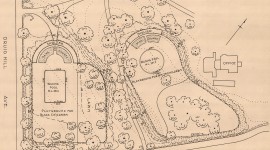Landscape Information
Established in 1881, This HBCU (Historically Black College and University) measures 5,500 acres and includes a 240-acre campus core located one mile northwest of Main Street. In 1882 the institution purchased 100 acres of a former plantation defined by rolling topography. Booker T. Washington, the institution’s first president, laid out the grounds, orienting Campus Avenue (now University Avenue) along its highest ridgeline. Lined with buildings grouped by academic themes, the thoroughfare served as the institution’s central spine and intersected with curvilinear drives that skirted shallow valleys. By 1890 the campus measured 680 acres, including contiguous and noncontiguous parcels.
Hired in 1892, architect Robert Taylor designed numerous academic buildings, which were constructed by students using bricks manufactured on site. In 1896 Washington engaged agricultural scientist George Washington Carver, who established the institution’s agricultural department and was responsible for the ground’s stewardship and improvements. In 1902 landscape architect David Williston joined the faculty and developed a Picturesque campus plan with Taylor, employing axial paths and informal planting of native trees and shrubs. The two also collaborated on the design of Booker T. Washington’s Tuskegee estate, the Oaks. They contributed to the campus design into the 1940s.
In 1948 the George Washington Carver Museum was established and in 1958 architect Paul Rudolph, with input from landscape architect Edward Pryce, produced a campus plan. Apart from a Modernist chapel (1969) the plan was unrealized. Pryce prepared a 1962 plan that retained features designed by of Taylor and Williston, including Hattie W. Kelly Court, known colloquially as “the yard.” Pryce became the campus landscape architect in 1977.
In 1965 the 50-acre Historic Campus District, including the George Washington Carver Museum and The Oaks, was designated a National Historic Landmark. The district was listed as a National Historic Site in 1974.
















